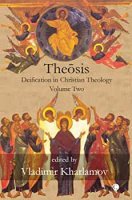The book, Theosis: Deification in Christian Theology, Volume 2, is an edited volume with various contributing authors. As a second volume of the series, the book takes a somewhat different approach from the first one. The first difference is seen by scanning the table of contents: this volume does not follow a chronological order in terms of the historical development of theosis. While several essays delved deeply in the historical development of theosis, the book still showed a faint idea of chronology. The opening essay was all about Jesus’s teachings which touched upon theosis, switched to a particular analysis of deification in the early Christian Church, and ended by looking at several Baptist theologians and their perspectives on this doctrine. Another significant difference was that the level of academic writing was perhaps more advanced than in the previous volume. This feature I liked because it presumed that the reader had already read the first volume. There were also several other things which made me appreciate this volume, including a correction of the first volume. While the first volume vaguely spoke of Palamism, particularly in a way which was dismissive but not explanatory and devoid of any sufficient reason why the latter position was wrong, the second volume massively improved on this issue. Even though it still maintained a position contrary to Palamism, I appreciated how Vladimir Kharlamov, the author of the fourth essay, addressed the Cappadocians and their view of the essence versus energies distinction. Moreover, I thought Kharlamov presented a fair portrayal of the Eastern Orthodox position in their interpretation of the Cappadocians, as well as the problems of the Palamite understanding of the latter. While not favoring the Eastern position, the essay could be recommended for those in the East who may perhaps want to hear a fair critique of their position.
Another essay that proved helpful addressed the Alexandrian and Antiochian schools of thought, particularly in either the dismissal (Antiochian) or propagation (Alexandrian) of theosis. The essay also gave the perspective of the two main theologians of the respective schools, Cyril from the Alexandrian school and Theodore of Mopsuestia from the Antiochian one. Elowsky, the author of this essay, while comparing the positions of the two schools, also made a reasonable connection between the thinking pattern between the Antiochian school and that of Protestantism, particularly in terms of hermeneutics. He rightly pointed out the overemphasis on a more “logical, historical, often compartmentalized approach to exegesis and approach to God” found in Protestantism (p. 178). This type of phenomenon could well be seen in the more modern type of “evangelical” churches, particularly in their lack of sacredness (e.g., sacred space, sacraments) and disenchanted approach to the worship of God. However, Elowsky tried to point out the extremes of both schools of thought. For example, the Antiochian emphasized the humanity of God to such a level that one lost the feeling of awe and wonder towards an overall transcendent being. The other danger went in the opposite direction with the Alexandrian school, elevating God to such a level that the latter became like the god of the philosophers—unknown and distant (p. 178).
Criticisms of this book could be directed to one essay, specifically the one concerning the Philokalia. I felt that reading it did not add any particular depth or contribution to the book, but that it looked more like a historical review than anything else. Another criticism could be perhaps the random chronology of the essays, which, in my opinion, had its positives and negatives. In a way, the book was well-rounded in that it had essays which delved into a particular topic concerning theosis and did them well. However, for some readers, it may seem that this approach lost a great deal of its chronological aspect.
Whatever the case, this did not strip the book of its positives which were plenty. As briefly mentioned before, issues were addressed in this book which one could have certainly found if one had read the first volume. While bearing in mind that no one approaches a topic with a blank slate, the big positive of this book as such was its all-round objectivity, however imperfect it may seem. A good example of this was Mark S. Medley’s essay on four Baptist theologians and their incorporation of theosis. After giving the perspective of the mentioned theologians, Medley also explained in a succinct manner where the positions of the Baptist theologians and that of Eastern Orthodoxy agreed and differed in terms of theosis (p. 234). Moreover, he also saw it fit to critique the position of the Baptist theologians where they were ambiguous, especially when they talked about the role of the Church and the sacraments in the life of deification. Furthermore, of chief concern for him was often the individualistic, voluntary, “transactional” model of salvation found in many Baptist churches (p. 206). Medley likewise spoke of how often people’s idea of salvation was grounded in their overemphasis on justification to the detriment of the role of sanctification (p. 241).
The book itself could be said to be a great improvement from the first volume and much more researched with thought-provoking information. The good side of this book was that it did not come from only one perspective. It tried to portray the Eastern Orthodox perspective, while at the same time criticizing it. It also brought to light Protestant, namely notable Baptist theologian’s appreciation and incorporation of theosis. Some could object that the Roman Catholic position wasn’t presented sufficiently. Perhaps this is true, but I felt that it was done in a way by Kharlamov in his essay on the Cappadocians where the latter was propagating a divine simplicity view, a default position in Roman Catholicism.
